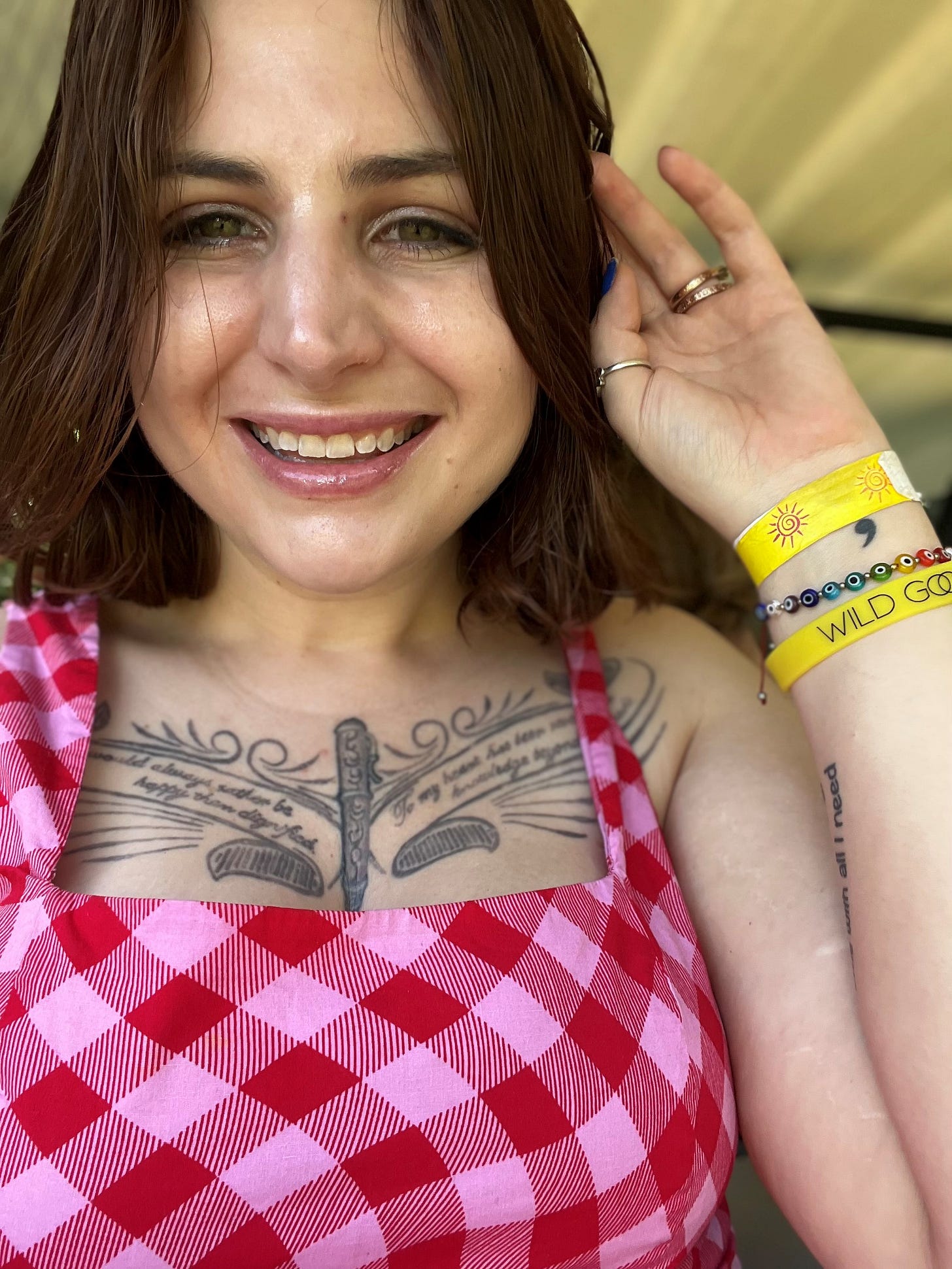Faith: Polyamory and Christianity in Rural North Carolina
In her second article for Y'all Weekly on the Wild Goose Festival, guest contributor Jennifer C. Martin talks about what it's like to tell her story in the South.
Editors Note: When Queen City Nerve chose Y’all Weekly as their “Best New Newsletter” of 2023, they specifically highlighted Jennifer C. Martin’s work as one of the reasons - though to be fair, most of her content is published on her Substack, “The Dirtbag Christian.” We’re happy to share her second piece for Y’all below.
I'm not from North Carolina. I'm originally from southeast Tennessee. But I was close to rural Appalachia, and that environment still calls to me: the lush trees, the red clay in the soil, the mountains, the creeks. But, because of political and religious reasons, that location doesn't always love me back. While I was raised in a conservative, Pentecostal family, I'm now a tattooed, polyamorous leftist.
I'm still a Christian, but it's hard for me to still identify with these more fundamentalist pockets of the country, no matter how much my soul yearns for the outdoors there.
These days, I live in Richmond, Virginia: a diverse, progressive, mid-sized city in a (sometimes) blue state that still has southern charm. But it's not Appalachia. It's Mid-Atlantic. It's not quite the same, but it feels a lot safer for me.
So, you can imagine the mixed feelings I had giving a presentation on non-monogamy and Christianity at the Wild Goose Festival in Union Grove, N.C. earlier this year. I'd spent three days already at the (likely, only) Airbnb nearby and had ventured out into the town in my spare time.
The primary grocery store is a Dollar General. I went to a restaurant called Burger Barn and saw a pitcher of lemonade on the counter like it was someone's mom's kitchen. I ordered a glass immediately. The entire place was covered in American flags, and it was crowded. Everyone knew each other. I loved it – but I wasn't sure if I'd be welcome there if they knew me.
I have two partners, and I live with both of them. I've made a career from talking and writing about being a polyamorous Christian. Some people are in the same boat as me and looking to come to non-monogamy without sacrificing their faith. Still, many people who are neither polyamorous nor Christian are just curious about the spectacle: how do I sit with the dichotomy of two identities that seem at odds with each other?
The Wild Goose Festival, a progressive Christian event of conferences, concerts, classes, and something that feels a little bit like church, is a safe haven in the middle of rural North Carolina. Pride flags hang freely everywhere, and the hundreds of parked cars and campers are lined with bumper stickers typical of liberal and leftist politics.
When I spoke on polyamory and Christianity for the first time in 2022, I was nervous – the topic is controversial even among Christians who think of themselves as affirming toward LGBTQ people. Because of how much community I've found as a result of speaking openly about polyamory, I was less nervous to talk about it again in 2023, even though I am aware that there will always be people who are opposed to any form of non-monogamy.
I often talk about theological arguments, not taking the Bible literally, the evolution of modern sexuality, and the bigotries that polyamorous families like mine often have to deal with (like my grandmother disowning me, for instance).
A lot of people who come out to hear me speak aren't non-monogamous themselves but want to do right by their friends, family, coworkers, and congregants who are. I try to approach it with a beginner's mindset; after all, I'd never heard the word "polyamory" before until I was in my mid-20s.
In my work, I’m trying to reach people who are scared. They often grew up in environments like I did, where sex was scary, and heterosexuality was mandated via threat of hellfire. Maybe they’re curious about what non-monogamy could look like in their lives, or maybe they’re struggling in their relationship with God. I think part of my strength is understanding where people are coming from and giving hope to wherever they might be going. I’m not necessarily coming from a place of intensive theological defense here.
Truthfully, I simply sit with the discomfort of being myself and sally forth anyway. I know not everybody will like or agree with me, and many people will have the worst opinion of me forever. Sometimes, that's okay. I feel the same way about their lifestyles and personal beliefs as they feel about mine. And I would never want to validate anything I consider genuinely harmful.

Doing a talk at the Wild Goose Festival means sitting in the muggiest, most humid North Carolina weather you could possibly imagine. There are bugs everywhere. Each tent is low-tech: you get chairs, microphones, and a big fan if you're lucky. Your makeup sweats off, and your hair falls flat and gets frizzy at the same time. But it's lovely to share your heart with people who want to learn more from you.
I'm so glad I found the Wild Goose community here in an area of the United States that reminds me so much of my hometown. The rural South can be controversial – and so can I. It's not easy to be a polyamorous Christian, but I'm still doing it. And in some ways, maybe that's why a small town in North Carolina is the best place to talk about sensitive topics and to deal with all the strange, poetic dualities of the human experience. Everything feels almost like home there, but nothing ever fully does.
You can read Jennifer C. Martin’s previous Y’all Weekly article on the Wild Goose Festival here.






